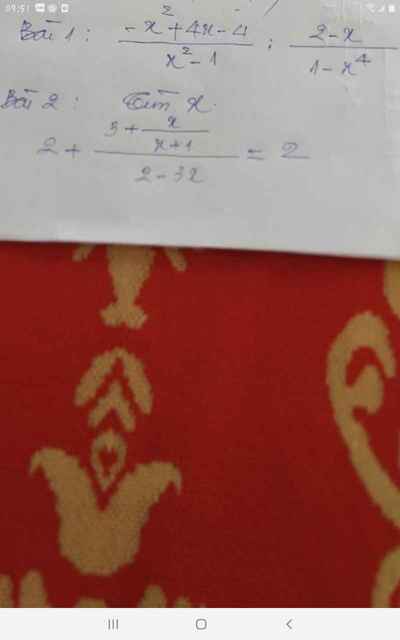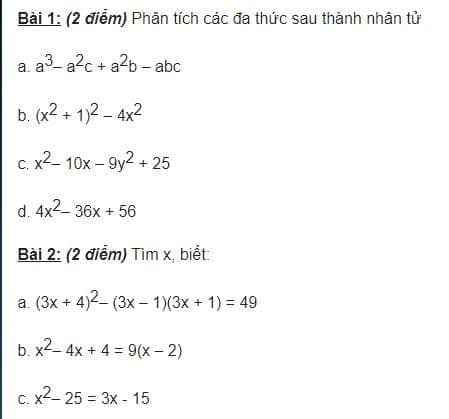Hãy nhập câu hỏi của bạn vào đây, nếu là tài khoản VIP, bạn sẽ được ưu tiên trả lời.

Bài 1:
Vận tốc cano khi dòng nước lặng là: $25-2=23$ (km/h)
Bài 2:
Đổi 1 giờ 48 phút = 1,8 giờ
Độ dài quãng đường AB: $1,8\times 25=45$ (km)
Vận tốc ngược dòng là: $25-2,5-2,5=20$ (km/h)
Cano ngược dòng từ B về A hết:
$45:20=2,25$ giờ = 2 giờ 15 phút.

Bài 1:
a.
$a^3-a^2c+a^2b-abc=a^2(a-c)+ab(a-c)$
$=(a-c)(a^2+ab)=(a-c)a(a+b)=a(a-c)(a+b)$
b.
$(x^2+1)^2-4x^2=(x^2+1)^2-(2x)^2=(x^2+1-2x)(x^2+1+2x)$
$=(x-1)^2(x+1)^2$
c.
$x^2-10x-9y^2+25=(x^2-10x+25)-9y^2$
$=(x-5)^2-(3y)^2=(x-5-3y)(x-5+3y)$
d.
$4x^2-36x+56=4(x^2-9x+14)=4(x^2-2x-7x+14)$
$=4[x(x-2)-7(x-2)]=4(x-2)(x-7)$
Bài 2:
a. $(3x+4)^2-(3x-1)(3x+1)=49$
$\Leftrightarrow (3x+4)^2-[(3x)^2-1]=49$
$\Leftrightarrow (3x+4)^2-(3x)^2=48$
$\Leftrightarrow (3x+4-3x)(3x+4+3x)=48$
$\Leftrightarrow 4(6x+4)=48$
$\Leftrightarrow 6x+4=12$
$\Leftrightarrow 6x=8$
$\Leftrightarrow x=\frac{4}{3}$
b. $x^2-4x+4=9(x-2)$
$\Leftrightarrow (x-2)^2=9(x-2)$
$\Leftrightarrow (x-2)(x-2-9)=0$
$\Leftrightarrow (x-2)(x-11)=0$
$\Leftrightarrow x-2=0$ hoặc $x-11=0$
$\Leftrightarrow x=2$ hoặc $x=11$
c.
$x^2-25=3x-15$
$\Leftrightarrow (x-5)(x+5)=3(x-5)$
$\Leftrightarrow (x-5)(x+5-3)=0$
$\Leftrightarrow (x-5)(x+2)=0$
$\Leftrightarrow x-5=0$ hoặc $x+2=0$
$\Leftrightarrow x=5$ hoặc $x=-2$



Ta có: \(\left(x-1\right)^2\ge0\) \(\Leftrightarrow x^2-2x+1\ge0\)\(\Leftrightarrow x^2+1\ge2x\).\(\left(1\right)\)
\(\left(y-2\right)^2\ge0\Leftrightarrow y^2-4y+4\ge0\Leftrightarrow x^2+4\ge4y\).\(\left(2\right)\)
\(\left(z^2-9\right)\ge0\Leftrightarrow z^2-6z+9\ge0\Leftrightarrow z^2+9\ge6z\).\(\left(3\right)\)
Từ \(\left(1\right),\left(2\right)\)và \(\left(3\right)\) nhân vế theo vế ta được:
\(\left(x^2+1\right).\left(y^2+4\right).\left(z^2+9\right)\ge48xyz\)
mà theo đề ta có:\(\left(x^2+1\right).\left(y^2+4\right).\left(z^2+9\right)=48xyz\)
nên \(\left\{{}\begin{matrix}x^2+1=2x\\y^2+4=4y\\z^2+9=6z\end{matrix}\right.\)
\(\Leftrightarrow\left\{{}\begin{matrix}x=1\\y=2\\z=3\end{matrix}\right.\)
Thay \(x=1;y=2;z=3\)vào biểu thức A ta được:
\(A=\dfrac{x^3+y^3+z^3}{\left(x+y+z\right)^2}=\dfrac{1+8+27}{\left(1+2+3\right)^2}=1\)
Vậy giá trị của biểu thức \(A=\dfrac{x^3+y^3+z^3}{\left(x+y+z\right)^2}\)là 1.


\(m^3+m^2-2m=0\)
\(\Leftrightarrow m^3+2m^2-m^2-2m=0\)
\(\Leftrightarrow m^2\left(m+2\right)-m\left(n+2\right)=0\)
\(\Leftrightarrow\left(m^2-m\right)\left(m+2\right)=0\)
\(\Leftrightarrow m\left(m-1\right)\left(m+2\right)=0\)
\(\Leftrightarrow\left[{}\begin{matrix}m=0\\m-1=0\\m+2=0\end{matrix}\right.\Leftrightarrow\left[{}\begin{matrix}m=0\\m=1\\m=-2\end{matrix}\right.\)
Vậy...
 Tính dùm tui bài 1 ik phép chia phân thức. ĐANG CẦN GẤP
Tính dùm tui bài 1 ik phép chia phân thức. ĐANG CẦN GẤP

 giúp mk nha mờn nhìu ạk
giúp mk nha mờn nhìu ạk



 mọi người giải giúp em với ạ em đang cần gấp lắm ạ
mọi người giải giúp em với ạ em đang cần gấp lắm ạ 






a)\(\dfrac{-x^2+4x-4}{x^2-1}\\ =\dfrac{-\left(x^2-4x+4\right)}{\left(x-1\right)\left(x+1\right)}=\dfrac{-\left(x-2\right)^2}{\left(x-1\right)\left(x+1\right)}\)
b) \(\dfrac{2-x}{1-x^4}=\left(2-x\right):\left(1-x^4\right)=\dfrac{2}{\dfrac{x}{x^4}}\)
Bài 1:
\(=-\dfrac{x^2+4x-4}{x^2-1}.\dfrac{1-x^4}{2-x}=\dfrac{-\left(x^2-4x+4\right)}{\left(x+1\right)\left(x-1\right)}.\dfrac{-\left(x+1\right)\left(x-1\right)\left(1+x^2\right)}{2-x}\)\(=1+x^2\)